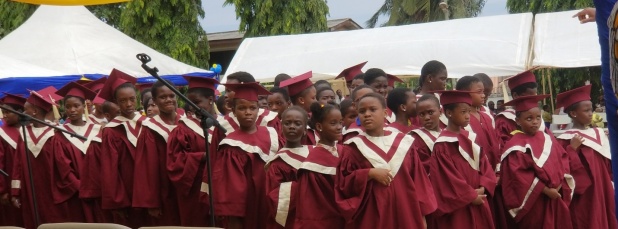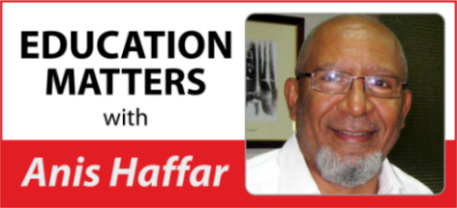·And the need to make basic and tertiary education most relevant for Ghana and Africa

The true essence of freedom or one’s independence resides in each person – from childhood to adulthood – being groomed to lead themselves and reach the highest potential possible. And the hope is that through schooling these basic human needs can be identified and nourished to benefit both the individual and the nation they live in. For that purpose, two concepts that come to mind readily, in matters relating to education – and which are commonly misconstrued – are syllabus and curriculum.
Syllabus
A syllabus tends to imply the subject – that is, the various topics and academic content of the subject – to be taught in the course of the study of that discipline. The objectives in a syllabus are mostly academic in nature, with periodic tests or assessments to check whether students have read or understood the contents and concepts. The series of tests may result in a summative assessment for a termly grade and are done through paper and pen “True / False”, “Multiple Choice”, or essay type questions.
Imagine studying music – focusing on the knowledge of musical scales, identifying bass and treble clefs, staccatos, allegros, etc. – on a piece of paper for a mark or letter grade. A syllabus tends to be that narrow in scope, leaving the learner stranded with the inability to play a simple flute or guitar.
That goes to show that having some knowledge about a subject is one thing; to know what to do with the knowledge is another matter. And this is where education in poor countries falter, leaving learners stranded, and keeping the poverty thriving long after a certificate we call a university degree has been awarded.
Curriculum
A curriculum, on the other hand, alludes to the skills and competencies students should acquire by the end of a study of a subject or discipline. It is wider in scope, with a far-reaching purpose where – in the earlier music example – a learner can play an instrument as the iconic Ephraim Amu used to teach, years back, at the Presbyterian Training College.
The fundamental difference between a syllabus and a curriculum is that the former leans towards the mere knowledge of a particular subject. The latter, however, is related to the all-round development of a student, or as some may call it: holistic or rounded; that is, being able to use suitable skills in beneficial ways.
Both have pedagogies fit for purpose: A syllabus, for one, answers the question of “what” will be taught in the course of study and the specific pedagogy or methodology that will be used. The pedagogy drives that objective. That is, the end towards which the means would be deployed:
For example: At the end of this unit of study, learners will be able explain, summarise, recall, repeat, etc. The pedagogy tends to be drills to drive the attainment of those prescribed objectives.
A curriculum, however, answers “how” a subject will be taught with particular skills, competences or standards in mind. Invariably, higher levels of applications drive a curriculum, with key actionable verbs such as: use, practice, demonstrate, adapt, develop, create, operate, innovate, etc.
Curriculum for authentic assessment
As noted in the column of July 22, 2019, “Authentic assessment aims at helping students to understand that any basic knowledge acquired, say from textbooks, must make sense in real-world settings, to make that knowledge useful.”
Additionally, the traditional forms of assessment, such as paper and pen activities and examinations serve academic purposes for a start; but, for sustainable development goals for eradicating poverty, education has to be useful in real-world settings. What is the point in being a critical thinker if the critical thinking cannot add value and improve one’s living conditions, quality of life, and longevity.
Authentic assessment “helps students to contextualise their learning by using their understanding to navigate real-life conditions and situation. As they draw together their knowledge and skills to engage productively and solve real problems, their behavior and personal growth shows clearly to both themselves and their teachers.”
Besides incorporating theoretical knowledge typical of a syllabus, a curriculum demands that the attitude, behaviour, abilities, performance and skills are inculcated in a learner for lifelong pursuits for both economic and inner fulfilment.
It demands teaching methods that include activities, projects, presentations, etc. for authentic assessments, and are suited for school-based assessment depicted, for example, in the service-learning component of the International Baccalaureate (IB) Middle Years Program (MYP), and Diploma Program (DP) qualifications.
Such a curriculum is planned, guided and designed for a purpose. Its trajectory captures the overall learning experience of a student through particular courses of study and supports a lifelong culture of performance based on a can-do spirit.
Human capital for Ghana
A most critical question these days is this: Who must be entrusted to teach – from the basic to tertiary levels – and what specific training must the modern teacher have? Such are the key questions going forward, and they must be answered with the future in mind; it’s not business as usual. For poor or developing nations to progress appreciably, the current system of merely following the dictates of a narrow syllabus is far too slow, passive and archaic for the needs of the times.
Additionally, the status quo victimizes the nation’s teeming youth, with irreparable damage. Today, situations of change and uncertainly – the need to map the unknown, the necessity for creativity and bold ideas for innovation to produce key products and services for the modern times – offer no choice but to design a superior education system that are proactive or forward looking. The new curriculum framework for pre-tertiary education provides a good beginning.
Email: anishaffar@gmail.com
Website: http://www.anishaffar.com


Dear Annis,
A very useful article for needed understanding around definition of the two words. What should be the extent of our focus on education within the overall national objective of increased production, wealth creation and the improvement of our human condition?
I would very much wish to have a discussion with you on this question one of these days.
Brgds as always.
CZ.
LikeLike
Dear Sir,
Thank you for explaining those two terms in the most simplified language. I enjoyed reading the article. I am also reading your book: “Strategies For Effective Teaching and Learning”. Thank you.
LikeLike
Dear Annie,
I loved that article very useful and deep to the roots …I wish all leaders in the educational sector have this same idea or have had the chance to read from this piece.
LikeLike